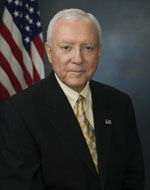A two-year shortage of saline solutions has had the attention of hospitals that have had to sometimes ration a product they once took for granted. But it has now caught the attention of some U.S. senators who are asking the FTC to look into whether saline producers have used the shortage to unreasonably jack up prices.
 |
| Sen. Orrin Hatch |
Senators from both parties have sent a letter to the Federal Trade Commission asking it to look into "possible illegal collusion" by saline solution manufacturers. "Price increases often help clear shortages, but in this case the shortage is still ongoing after nearly two years, raising questions about the incentives of the saline suppliers to solve this problem and about possible coordination among them," the letter says.
The letter from Republican Senators Orrin Hatch and Mike Lee and Democrats Richard Blumenthal and Amy Klobuchar asks the FTC to pay particular attention to whether the three key saline producers, rather than trying solve the shortage, are even using it to sell other equipment by tying saline sales to other products such as "pumps, tubing, and catheters."
In an emailed response, a Hospira spokesperson said that Hospira would cooperate with any inquiry by the FTC. The statement said that while "market fundamentals" have weeded out some suppliers that didn't want to invest in saline production, Hospira responded initially to the shortage "by expanding its production of saline products to maximum capacity through manufacturing 24 hours a day, seven days a week."
The company, now part of Pfizer ($PFE), did not respond to a specific question about the whether pricing was tied to the purchase of supplies. But it said: "At the current prices Hospira's IV solutions remain one of healthcare's greatest values."
Baxter ($BAX) spokesman John O'Malley said in an emailed statement that, while the company had raised its prices for saline by "modest ... single to low double digit" amounts, it had not pushed the prices up by the 200% to 300% suggested by the senators. He also pointed out that Baxter has added production from overseas to supplement the U.S. supply of saline.
But in a conference call with analysts this summer, Baxter CEO Robert Parkinson also pointed out that redirecting those supplies was returning a premium for the drugmaker. "It also reflects our commitment to ensuring that we are optimizing our global supply and allocating or reallocating products to markets that generate enhanced returns aligned with our margin improvement goals," Parkinson said, according to a transcript from Seeking Alpha.
Federal legislators have been looking for villains since reports in FierceBiotech last month that Turing Pharmaceutical had raised the price of an HIV drug 5,000% after becoming the sole supplier. The stories set off a social media frenzy that has their constituents up in arms about rising drug prices. Both Democratic presidential candidates Senator Bernie Sanders and Hillary Clinton have responded with proposals they say would limit drugmaker's ability to raise prices. And there have been a host of federal investigations hatched in the last year looking into pricing of both branded and generic drugs.
Valeant Pharmaceuticals ($VRX) has been called on the carpet by federal legislators, and shunned by the industry, after it was reported the company routinely jacked up prices of some of its drugs by significant amounts. It was reports that it had increased the prices of cardio drugs Isuprel and Nitropress 536.7% and 236.6%, respectively, that set things off. But it has found itself trying to defend a practice that led to a 65% average increase on its drug prices last year, the highest in the industry. Besides questions from federal legislators, the company has acknowledged receiving subpoenas from federal investigators wanting info about its pricing.
- find the letter here